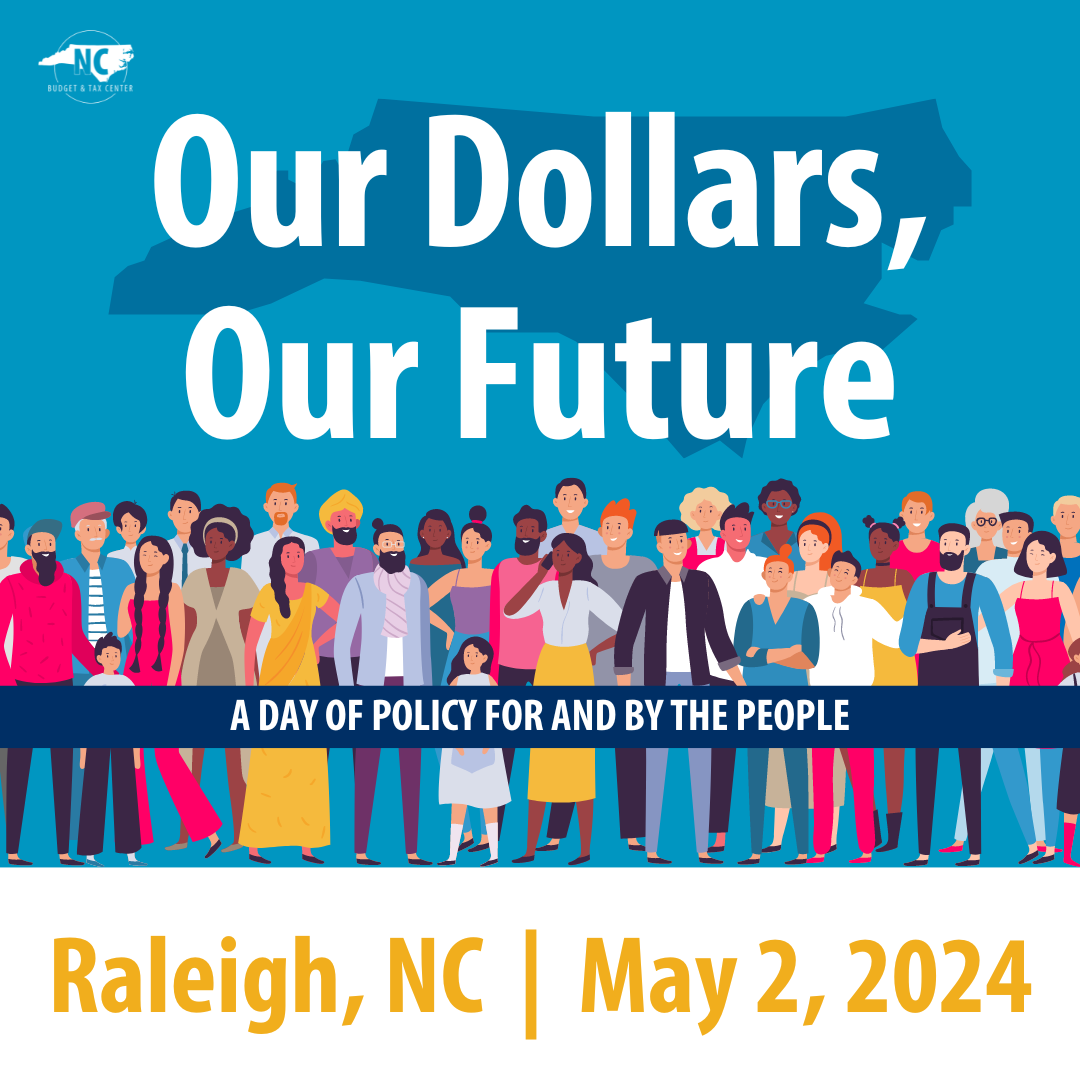
NC Senate budget plan deepens tax cuts in a rushed, untransparent process
Earlier this week, the North Carolina Senate introduced a plan for the state’s two-year budget that was crafted behind closed doors, shielded from the public and many lawmakers. Today, the chamber passed the budget, with only a few small changes from the version introduced, after quickly moving through a few committees, with little to no opportunity for debate or consideration of the input and solutions that many legislators attempted to bring forward.
This budget doubles down on the anti-democratic tactics championed by the current Republican majority — agree on the spending number, make decisions about investments behind closed doors, prevent debate, and block opportunities for changes.
It takes a significant leap toward implementing an agenda that prioritizes culture wars over common good, privatization over sound public policies to meet the need for good jobs, affordable child care, and housing. It is only able to move forward because of ongoing efforts to weaken checks and balances, dismantle representative democracy, and discourage elected leaders from listening to and legislating for all of their constituents.
Let us be clear: This budget is downright harmful for North Carolina, and it will be for years to come.
At a time of increasing economic uncertainty and a supermajority secured without an election, this budget takes ideas that have not delivered — income tax cuts and privatization of public goods — and locks them in for another decade.
The budget deepens the rate cuts to individual income taxes, moving the state further down the path to zero income taxes, without fully accounting for their choices in terms of what services will be cut or where funds would be raised.
The budget expands funding for private school vouchers while once again demonstrating indifference to the state’s Constitutional requirement to fund a sound basic education as outlined in the Leandro remedial plan, blocking students from receiving their rightful education for two more years.
The Senate budget seeks to normalize generations of harm and harmful economic theories for years to come, blocking North Carolinians from the well-being and security that comes from coming together to fund our future.
Aligns the spending total with the arbitrary spending cap determined at the outset of the process
The budget proposes spending $29.7 billion in the first year of the two-year budget, which represents 4.85 percent of spending as a share of the economy. Compared to the 50-year average of spending as a share of the economy of 5.83 percent, this budget falls $5.6 billion below the average.
In the second year of the two-year budget, the budget proposes spending $30.8 billion, representing 5 percent of the state’s economy, which falls $4.3 billion below the 50-year average in spending. Notably, the second year of the biennium is subject to changes in next year’s short legislative session, when lawmakers revisit their proposed spending for year two of the budget and frequently make changes.
The budget totals proposed in the Senate budget fall in line with spending targets agreed upon by Senator Berger, Speaker Moore, and other key decisionmakers at the outset of the budget process. Disconcerting is the arbitrary nature of the spending targets, targets that are confined by the lower revenue generated as a result of tax cuts and which create artificial constraints often cited by lawmakers in summaries of the budget provided by budget writers on the floor. Instead, North Carolinians deserve a budget that can meet their needs, not one that’s constrained to what’s left after tax cuts are provided to the wealthy and corporations at the expense of needs.
Lowers the income tax rate at the expense of current and future needs
On top of the 2021 tax changes, which include elimination of the corporate income tax by the end of the decade, the Senate budget plan deepens the tax cuts permanently without addressing devastating needs across North Carolina.
The Senate incorporated into its budget the proposal its leaders introduced as a separate bill earlier in this legislative session, which would bring the personal income tax rate down to 2.49 percent by 2030, with a step down in the in-between years.
Without a targeted tax credit for working North Carolinians through the reinstatement of the state Earned Income Tax Credit, or for North Carolina families with children via a state Child Tax Credit, Senate leaders forego proven ways to provide tax relief to those who most need it. Instead, they provide broad rate reductions to the already flat personal income tax, which data shows time and again benefits those with the highest incomes with very little benefit to those who need it most.
In addition to the rate cuts, the Senate budget includes a host of fee increases and introduces new fees. This increasing reliance on more regressive forms of taxes place a greater burden on those with lower incomes and adds complexity to nontax revenue. A better tax code would ask more of those with higher incomes through a graduated income tax rate structure and deliver the equitable revenue that North Carolina needs to pay for its long overdue needs as well as needs to come.
Diverts nearly $5 billion to reserves with no clear path for how or when funds will be put to use
The Senate budget continues the recent trend by legislative budget writers of siphoning funding from the General Fund into a host of various reserves, often with little to no transparency about what the reserves will do, who will make decisions about how to allocate those funds, and the process for allocation.
The Senate budget directs nearly $5 billion in state dollars — on top of the General Fund appropriations and statutory obligations put in place by current legislative leaders — to 12 reserve accounts, including the Rainy Day Fund and State Capital and Infrastructure Fund. Representing more than 20 percent of funding appropriated in the budget, these transfers limit what the public can track in the state’s budget and through the implementation of the projects funded with the reserved dollars, limiting transparency in what is already a process obscured from public view.
Obstructs the democratic process and further consolidates power
With the passage of the Senate budget a mere four days after the proposal was introduced and made public, this new normal for legislative budgets barely meets the minimum criteria for how a bill moves through the legislature.
The Senate’s budget process fails in the following ways:
- Establishing prior to the release of the proposal a tight timeline during which the state’s most important piece of legislation will be determined
- Releasing the roughly 1,000 pages (combining the budget bill and committee report) less than 24 hours prior to the first committee meeting to discuss the proposal
- Preventing substantive review in issue area committee meetings
- Cutting out of the budget process many, if not most, lawmakers, and therefore many, if not most, North Carolinians, and imposing very restrictive and unreasonable rules for making amendments
- Crafting the budget behind closed doors, without opportunity to take stock of needs and hear from the public
- By all but explicitly discouraging discussion and debate
With the rules set by Senate President Pro Tempore Phil Berger and Rules Committee Chair Senator Bill Rabon, this budget’s breakneck speed and untransparent process comes at the expense of input from lawmakers elected by constituents to represent their interests, and therefore at the expense of all North Carolinians as well.
What comes next
As the NC House and Senate leaders now go into their conference committee process behind closed doors to come to agreement on a compromise version of a two-year plan for the state, it will be even more difficult to learn what will be the criteria for putting forward a final budget that will be sent to the Governor for consideration. The two plans differ in their funding priorities, inclusion of substantive policy changes, and perhaps most significantly in their tax plans.
But they’re more alike than they are different because they continue to ignore the common good and the role of public funds in meeting the needs of millions of North Carolinians struggling to make ends meet and secure a better future for themselves, their families, and their loved ones.
Instead of finding compromise between the House and Senate budget proposals, it’s clear that what North Carolina needs lies outside of those proposals. What North Carolina needs is a budget that works for people. A budget that is created with the people’s input, with the input of the lawmakers they elected to represent them, and with North Carolina’s long-term interests in mind.


